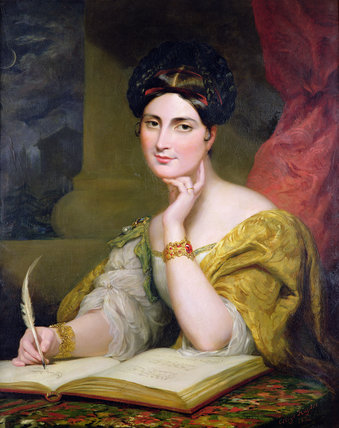| Caroline Norton | England | 1808 - 77 | Legal Reform |
 Caroline Norton by Sir George Hayter in 1832
In mid-nineteenth century England women’s legal rights were governed by the laws of coverture. According to these, on marriage, a man and woman became a single legal entity and, as a result, a husband acquired rights over all of his wife’s property. Wives lost any power to enter into contracts or to make wills as independent people. Husbands, but not wives, could sue for divorce.
Caroline Norton by Sir George Hayter in 1832
In mid-nineteenth century England women’s legal rights were governed by the laws of coverture. According to these, on marriage, a man and woman became a single legal entity and, as a result, a husband acquired rights over all of his wife’s property. Wives lost any power to enter into contracts or to make wills as independent people. Husbands, but not wives, could sue for divorce.
Caroline Sheridan was born into a well-connected but impoverished family. She accepted the marriage proposal of Tory MP the Hon. George Norton, though they had little in common and the marriage was soon very unhappy. Norton was discovered to have misrepresented his financial position and began to subject his wife to vicious beatings. Caroline found consolation in writing and the publication of her verses led to appointments as magazine editor which brought some measure of financial independence. In 1836, she finally left her husband who responded by accusing her of adultery with the Home Secretary Lord Melbourne, despite his previous encouragement of the friendship. He sued Melbourne for seducing his wife and, although he lost the case, the publicity ruined Caroline's reputation. Norton refused Caroline access to her three children and attempted to take her earnings from writing.
Caroline Norton campaigned for legislative change to make women equal to men in the eyes of the law. She lobbied influential individuals and wrote a series of pamphlets, including Observations on the Natural Claim of a Mother to the Custody of her Children as affected by the Common Law Right of the Father (1837) and English Laws for Women in the Nineteenth Century (1854). Norton’s efforts were influential in bringing about the Custody of Infants Act 1839, the Matrimonial Causes Act 1857 and the Married Women's Property Act 1870. Thus her achievement is to have instigated changes in legislation which ameliorated the position of many women.
 This article is part of the world-changing women collection. All the articles in this collection are specially produced for the How women changed the world interactive tour created to reveal the untold stories the history books left out.
This article is part of the world-changing women collection. All the articles in this collection are specially produced for the How women changed the world interactive tour created to reveal the untold stories the history books left out.
You can also view these articles without the interactive feature here.



Rate and Review
Rate this article
Review this article
Log into OpenLearn to leave reviews and join in the conversation.
Article reviews